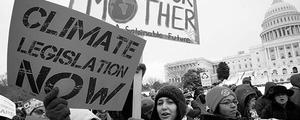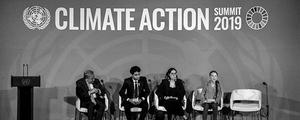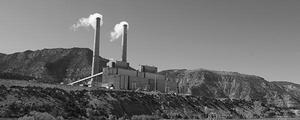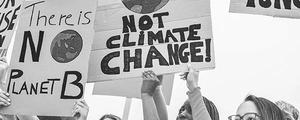We don't have to look far these days for news about the environment. We have seen a highly publicized address to a U.N. climate change meeting by a 16-year-old activist from Sweden; climate change strikes around the world; a strongly contentious clash between the state of California and the federal government on auto emissions standards; efforts by the coal industry to lambast the regulations put in place by the Obama administration as the use of coal as an energy source continues its slide; and exhortations from Democratic presidential candidates and other leaders that climate change constitutes an existential threat to humanity's continued existence.
Public opinion on these critical, complex and controversial issues? As is often the case with Americans' views on important and highly visible topics, the picture is quite complex, although I think the data show strong public agreement on several environmental specifics.
Let's look at some recent news in the context of U.S. public opinion.
California Emissions Standards and the Federal Government
Last week, the U.S. Department of Transportation's National Highway Traffic Safety Administration and the U.S. Environmental Protection Agency issued the "One National Program Rule." The core of the ruling is the withdrawal of "the 2013 Clean Air Act waiver that authorized California to pursue its own tailpipe greenhouse gas emission standard (fuel economy standard) and ZEV [zero emission vehicle] mandate." California has stricter air standards than the national guidelines, and California Gov. Gavin Newsom claims that the latest ruling is a "political vendetta" and "a move that could have devastating consequences for our kids' health and the air we breathe." Newsom says: "We will fight this latest attempt and defend our clean car standards."
The actual issues involved in the California versus Trump administration controversy are complex, and each side claims it is doing the right thing for all concerned. The data are clear, however, that the majority of the American public wants their government to do more, rather than less, to regulate the use of fossil fuel. Plus, at least one survey shows more sympathy for the California position than for the federal government's.
Gallup polling last year found 66% of Americans in favor of "setting higher emissions standards for automobiles" and an even higher percentage wanting "higher emission and pollution standards for business and industry." A recent Washington Post-Kaiser Family Foundation poll showed that 66% of Americans "oppose [President Donald] Trump's plan to freeze fuel efficiency standards rather than enforce the Obama administration's targets for 2025," and about the same percentage support "state governments setting stricter fuel efficiency targets than the federal government."
More broadly, 60% of Americans in Gallup polling say they favor proposals to "dramatically reduce the use of fossil fuels such as gas, oil and coal in the U.S. within the next 10 to 20 years in order reduce greenhouse gas emissions," while 36% are opposed. Americans are also more likely to say they want the U.S. to put less rather than more emphasis on the production of oil. And, as my colleague Lydia Saad summarized earlier this year: "By the widest margin since 2000, more Americans believe environmental protection should take precedence over economic growth when the two goals conflict. Sixty-five percent now choose the environment, up eight percentage points from a year ago, while 30% choose the economy."
Climate Strike, U.N. Climate Summit, Thunberg
The teenage Swedish climate activist, Greta Thunberg, on Monday addressed international leaders at the U.N. in New York with an emotional plea to take more action on climate change, saying: "People are suffering. People are dying. Entire ecosystems are collapsing. We are in the beginning of a mass extinction, and all you can talk about is money and fairy tales of eternal economic growth. How dare you?"
Former Vice President and erstwhile presidential candidate Al Gore opined in a New York Times editorial last week that climate change is "the gravest threat faced by civilization," saying, "This is our generation's life-or-death challenge. It is Thermopylae, Agincourt, Trafalgar, Lexington and Concord, Dunkirk, Pearl Harbor, the Battle of the Bulge, Midway and Sept. 11." Democratic presidential candidates call climate change an "existential crisis" threatening the existence of the human race.
Existing public opinion data, however, reveal a mixed picture on Americans' level of concern about climate change. There is some evidence that concern is increasing modestly, but climate change is by no means at the top of Americans' list of problems facing the nation.
In our September Gallup update of the "most important problem" question, 6% of Americans name environmental or climate change issues. This is obviously low on an absolute basis, and certainly, we can assume, lower than climate change activists believe should be the case. But the environment is actually tied with race relations as the third-most-frequently mentioned single problem in the September survey, behind only the government and immigration -- and one percentage point ahead of healthcare and guns, which have 5% of mentions each. The 6% mentions of the environment as the top problem also tie the highest recorded for that issue since 1990, although well behind the large percentages of Americans who mentioned the environment as the nation's top problem in the late 1970s.
Responding to a separate question, some 47% of Americans in a March Gallup poll said they worry "a great deal" about the quality of the environment, tied for the fourth-most-worried-about problem in the list of 15 issues tested, and modestly higher than in most previous years. In January, 43% of Americans said they were satisfied with the quality of the environment, putting it in the middle of the list of issues included in the survey.
As for climate change itself, Lydia Saad summarized our latest Gallup public update, saying, "Americans' views about global warming have held steady in the past year near the high points reached in 2017 and 2018. Currently, about two-thirds acknowledge in various ways that global warming is a real problem. At the same time, less than half express intense concern about the issue, although concern has been higher from 2016 through 2018 than it was previously."
The Gallup research shows that 51% of Americans can be classified as "Concerned Believers," meaning they "are highly worried about global warming, think it will pose a serious threat in their lifetime, believe it's the result of human activity, and think news reports about it are accurate or underestimate the problem." That's as high as it has been but still represents just a bare majority of the public.
Pew Research has shown that 57% of Americans say global climate change is "a major threat to the well-being of the United States," not much changed in the past few years, but higher than it was in 2013.
Of course, one of the most fascinating phenomena in recent public opinion history is the increasing divide between Republicans and Democrats in their attitudes about climate change. Gallup Scholar for the Environment Riley Dunlap outlined these political divisions in detail in his April overview, highlighting in particular the enormous gaps in how Republicans and Democrats look at climate change in the years since Trump took office. It's hard for any issue to generate extraordinarily high levels of concern among the overall population with this type of partisan divide. (An interesting Brookings Institute analysis outlines other reasons why concern about climate change may not be as high as some would expect.)
Oil and Gas Industry Promotes Its Efforts to Protect the Environment
Leaders of the petroleum industry have clearly realized that they need to burnish their environmental image. Executives of oil and gas industry companies gathered in New York on Monday to present evidence to that effect. As the U.N. climate change meeting was going on across town, the energy industry consortium news release outlined their "Oil and Gas Climate Initiative" and "announced further initiatives to accelerate the reduction of greenhouse gas emissions," saying the group is "scaling up the speed, scale, and impact of our actions in support of the Paris Agreement" and that "We are committed to enhancing our efforts as a constructive partner with governments, civil society, business and other stakeholders working together to transition to a net zero economy." (Two-thirds of U.S. energy Americans use currently comes from oil and natural gas, according to recent estimates.)
These efforts come at a time when the fossil fuel industry in the U.S. has major image problems -- although improved this year.
Gallup includes the oil and gas industry in our yearly update on the images of business and industry sectors, and oil and gas has perennially been near the bottom of the list. In this year's update, the oil and gas industry has a +3 net rating, meaning that slightly more people have a positive than a negative opinion. This puts it in 21st place out of 25 industry sectors tested. But that's actually a new high for oil and gas since we began the measure in 2001. By contrast, the lowest-rated sector, the pharmaceutical industry, has a -31 net rating, while the highest -- the restaurant industry -- has a +58 net rating.
Getting a bit more specific, there are some indications that natural gas has a better image than oil. When we ask Americans about their views of expanding or shrinking an emphasis on various sources of energy, natural gas comes across more positively than oil. Some 46% of Americans favor putting more emphasis on natural gas, compared with 28% who favor more emphasis on oil.
Continuing Battle Over Coal
The U.S. Energy Information Administration (EIA) reported this month that the use of coal as an energy source is down and will continue to shrink: "EIA forecasts that the share of U.S. [energy] generation from coal will average 25% in 2019 and 22% in 2020, down from 28% in 2018."
The coal industry continues to blame Obama-era regulations for the sharp decline in their industry. The president of the West Virginia Coal Association, as one example, recently lamented that "We remain a long way from the 170 million tons we produced in 2008, before the Obama administration began its war on coal. And we may never get back to those levels, because most of those 400 coal-fired power generation units Obama shut down with his regulatory assault have been torn down, left to rust or converted to natural gas."
There is little sympathy for coal as an energy source from the American people, however. When asked about putting more emphasis or less emphasis on various sources for producing domestic energy, half of Americans say there should be less emphasis on coal, while 22% say there should be more, putting coal at the bottom of the six energy sources tested (25% say the emphasis on coal should stay the same). Americans are most positive about putting more emphasis on solar power and wind.
Bottom Line
The bottom line? Americans are concerned about the quality of the environment and are sensitive to the environmental harm done by various energy sources. Given this, the significant majority of Americans appear amenable to the idea of de-emphasizing fossil fuels, whether through laws that beef up fuel efficiency standards or by discouraging the production of heavy polluters like coal. If politicians were to agree on solutions along these lines, they would clearly gain majority public support. Americans, however, don't seem as highly alarmed by the status of the environment as are many politicians and climate change activists, and so far, we have not seen significant public pressure on Republican Party leaders who remain opposed to drastic environmental policy changes.




